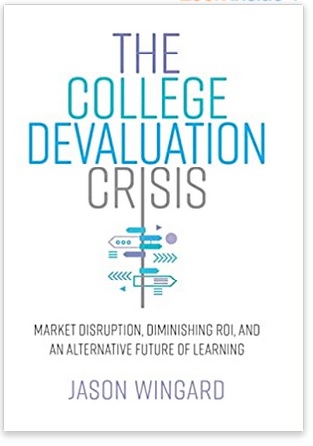Dear Commons Community,
I have just finished reading Jason Wingard’s The College Devaluation Crisis: Market Disruption, Diminishing ROI, and an Alternative Future of Learning (Stanford Business Books, 2022). Wingard is a college administrator who recently resigned as President of Temple University after a very short tenure. In The College Devaluation Crisis, he posits that the “golden age” of college education lies behind us. Between World War II and the Great Recession of 2008, a college degree reliably led to higher salaries and upward mobility. Today, however, the landscape has changed, and the “value of a college degree” — understood in terms of “return on investment,” or ROI — is collapsing. By 2030, Wingard predicts, college “will be replaced as the dominant pathway for the kind of talent development that presages professional readiness and career success.” Here is an excerpt of a review from The Chronicle of Higher Education Chronicle.
“Wingard’s recent book on the future of higher education serves as an excellent introduction to an ambitious vision shared by a host of higher-education reformers. The book advocates a turn away from traditional curricula toward alternative pedagogies that emphasize marketable skills. The future it sketches teems with business-minded academic reforms, outsourced course content, and the substitution of high-cost human teaching with cheaper technological alternatives.
It might be tempting to dismiss the writings of a failed university president as irrelevant, but that would be a mistake. Wingard’s book advances a broad program that extends beyond the deans, presidents, and trustees who promoted his career through the academy. That program is supported by high-level policymakers from both major political parties, by CEOs and financial executives who serve on university boards, by influential investors, and by sympathetic
These ideas will not die with a single resignation. Unless a broader coalition mobilizes to stop them, they will continue marching across the landscape of higher education like zombies, transforming the content and purpose of curricula in the image of our post-industrial, financialized moment.”
I agree with The Chronicle’s assessment. The combination of political leadership, state governing bodies, and corporate America, especially those companies who will benefit financially from Wingard’s vision, are moving rapidly to transform American higher education. Technology will be the vehicle by which they will possibly succeed!
Tony



